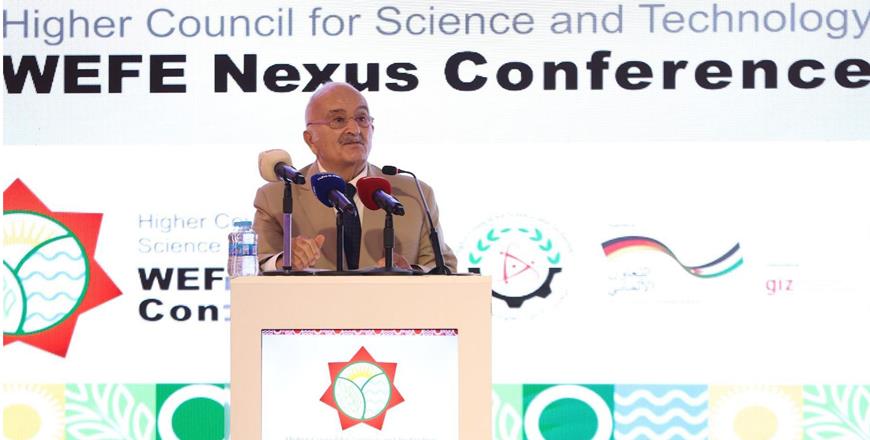
Prince Hassan Proposes Creation Of Regional Water, Energy Community For Mashreq Countries
The prince's remarks came during the WEFE Nexus Conference, which was organised by the Higher Council for Science and Technology, with the support of the German International Cooperation (GIZ), and funded by the German Federal Ministry for Economic Cooperation and Development (BMZ).
German Ambassador to Jordan Bertram von Moltke and ministers of water and irrigation, environment, and energy and mineral resources attended the conference.
In his opening remarks, Prince Hassan, chairman of the Higher Council for Science and Technology, stressed the critical importance of WEFE Nexus in the Mashreq region.
He noted that this framework can foster cross-border cooperation, reduce competition over scarce resources, and promote mutual benefits.
The Prince stressed the importance of decision-making based on reliable data and absolute facts to ensure equitable stability and independence in the region.
He highlighted the need for integrating the WEFE nexus to serve human capital, making local communities key stakeholders in developing good governance.
"It is time for the people in our region to move from being mere followers to becoming active citizens," he said, underlining the necessity of collaboration across sectors to achieve effective governance of the WEFE Nexus.
Moltke stressed the deep interconnections between the four sectors, stressing that addressing challenges in one sector cannot be done in isolation from the others.
“If we are thinking about water, we must simultaneously consider energy, food, and the environment. These sectors rely on one another,” Moltke said, adding,“You cannot pump water for agriculture or household use without energy, and every step in this process has environmental consequences.”
He highlighted the crucial role of AI in managing these complex interconnections, particularly in a country like Jordan, where water availability is critically low.“While the global average is 500 cubic metres of water per capita, Jordan struggles with only 60 cubic metres."
Mashhour Refai, secretary general of the Higher Council for Science and Technology, echoed Prince Hassan's and Moltke's sentiments, noting that AI offers powerful tools for resource management, predicting future water demand, identifying leaks, and optimising energy use within smart grids.
By analysing data across sectors, AI enhances efficiency and sustainability in ways that traditional methods cannot, he said.
He also pointed to AI's potential in revolutionising food production through precision farming, using data from sensors and advanced equipment to optimise crop management, predict weather patterns, and assess soil and plant health.
Refai said that the conference aimed to strengthen cooperation between the WEFE sectors, exchange best practices for integrated solutions, and highlight the role of AI, the Internet of Things, and renewable energy integration in achieving sustainable development.

Legal Disclaimer:
MENAFN provides the
information “as is” without warranty of any kind. We do not accept
any responsibility or liability for the accuracy, content, images,
videos, licenses, completeness, legality, or reliability of the information
contained in this article. If you have any complaints or copyright
issues related to this article, kindly contact the provider above.
Most popular stories
Market Reseach
- B2PRIME Strengthens Institutional Team's Growth With Appointment Of Lee Shmuel Goldfarb, Formerly Of Edgewater Markets
- BTCC Exchange Scores Big In TOKEN2049 With Interactive Basketball Booth And Viral Mascot Nakamon
- Ares Joins The Borderless.Xyz Network, Expanding Stablecoin Coverage Across South And Central America
- Primexbt Launches Stock Trading On Metatrader 5
- Solana's First Meta DEX Aggregator Titan Soft-Launches Platform
- Moonacy Protocol Will Sponsor And Participate In Blockchain Life 2025 In Dubai
- Primexbt Launches Instant Crypto-To-USD Exchange


















Comments
No comment